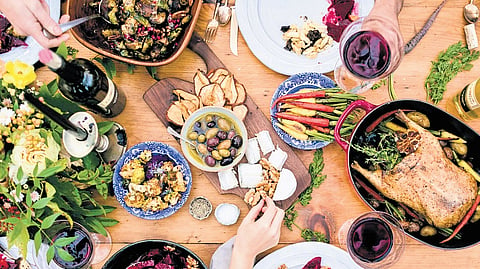

The holiday season is synonymous with festivities, family gatherings, and indulgent meals. While it is a time to celebrate, many of us also abandon our usual eating patterns, leading to weight gain and compromised health. However, enjoying the season’s delights is possible without compromising your nutrition goals.
Research suggests that most adults gain an average of 0.5–1 kg during the holiday season. While this may seem minimal, the weight is often retained.
Strategies for a healthy holiday season:
Practise portion control
Holiday meals are often rich in calories, and overeating is common. Practising portion control can help manage calorie intake without skipping your favourite dishes.
Use smaller plates to help control portions.
Start with salads or vegetable dishes to fill up before moving on to heavier options. If you’re going out for brunch or dinner, consume a snack rich in fiber and protein before heading out to prevent rapid hunger.
Balance your plate
Following the 50-25-25 rule can help maintain nutritional balance:
Fill 50 percent of your plate with non-starchy vegetables like greens, carrots, or broccoli. Reserve 25 percent for lean proteins like turkey or fish.
Use the remaining 25 percent for whole grains or starchy sides like sweet potatoes. This approach ensures you get the nutrients you need while avoiding an overload of fats and sugars.
Be mindful of liquid calories
Holiday beverages like eggnog, cocktails, and sugary hot drinks are calorie-dense. Beverages often contribute to unrecognised calorie intake.
Opt for water, herbal teas, or sparkling water. fruit juice.
Limit alcohol consumption to one or two drinks, and choose lighter options like wine or spritzers.
Stay physically active
Regular physical activity can help offset some of the holiday indulgences. Simple strategies include: taking a walk after meals to aid digestion and burn calories; participating in family activities like dancing, sports, or holiday hikes; prioritising short, home-based workouts if time is limited; a 10-15 minute walk after meals.
Plan ahead
Attending holiday parties or gatherings often involves unpredictable food choices. Eat a healthy snack, such as fruits or nuts, before heading out to avoid overeating at the event. Offer to bring a healthy dish to the gathering, ensuring there’s at least one nutritious option available. vourite treats rather than eating them mindlessly. Focus on quality over quantity, choosing the items you enjoy most.
Long-term health benefits
Adopting healthier habits during the holidays doesn’t just prevent weight gain; it sets the tone for a more mindful approach to eating in the New Year.